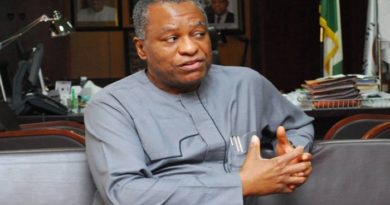2017: Experts believe Naira will still be under pressure
Some financial analysts with in the country have said that the Naira will still remain under pressure and unstable, even with the current market regulatory framework, until the market is allowed to operate freely and efficiently.
This was the view of a group of analysts at Financial Derivatives Company (FDC) Limited in their outlook for the naira in 2017.
The company, led by Mr. Bismarck Rewane, its chief executive officer said that the adoption of multiple exchange rates which involves the use of different exchange rates for different transactions has a lot of consequences for the local currency.
In its monthly economic report with the theme, “2017 Periscope: Year of Hope, Anticipation and Aspiration,” the FDC crew said multiple exchange rates usually form an important component of an interventionist or state controlled economic development model.
The consequences according to the analysts include: pervasive state intervention in the economy; financial repression; restrictive trade regimes and closed capital accounts.
The costs are high in terms of trade regimes, exchange controls leading to barriers to export sector and reduced foreign exchange (forex) earnings.
According to the FDC think tank, the multiple exchange rate regimes also lead to mis-allocation of resources, lower fiscal revenues and a smuggling boom as well as rent seeking activities driven by a complex set of administrative controls.
For Nigeria to escape from this forex trap, the authorities need to understand that there is a need for a properly functioning market said FDC analysts.
A well functioning forex market the company stated, allows the exchange rate to respond to market forces and reduce market distortions.
In the words of Rewane: “Russia and Kazakhstan recently did this and their currencies sank for a short period and then recovered sharply. On the other hand, Venezuela fell into the trap and has become a basket case.
“The CBN will need to eliminate or phase out regulations that stifle market activity; create a sense of two-way risk in the market; reduce its market making role and stop indirect or overt rate determination; increase market information on the sources and uses of foreign exchange; there must be liquidity, transparency and openness; the CBN as a regulator must be firm in dealing with market infractions.”
According to FDC, forex policies usually complement trade and investment policies. The Nigerian government will in 2017 strive towards greater coordination of these policies, and will move from its current bias for a command economy monetary policy towards a mixed economy.
“I believe that with oil prices at $55 per barrel and production back up to 2mbpd, the naira will slip in the interbank markets to N350-N380/$. It will fall in the parallel market to N520/$ before recovering sharply to N425/$.
“These projections are based in the assumption that the market will be reformed and that sanity will return to what is now essentially a foreign exchange asylum,” the FDC CEO stated in a comment.
In her own comment on Nigeria’s recovery from recession, another analyst Damilola Akinbami said it was important to note that an economic recovery is a process and not an event.
Like a patient recuperating from malaria she said, the symptoms of recovery start to manifest when a country is able to tolerate little quantities of food at first before a return to normal consumption.
The arduous journey to recovery may take another 18 months she further stated. However, the signs of recovery will start to manifest in 2017, and the anticipated recovery will be slow and painful.
“This implies that we would witness several quarters of contraction in output before slowly returning to positive growth.
“The government needs to adopt policies that will directly target consumption and increase spending, whilst attracting new investment to boost growth,” the analyst stated.




